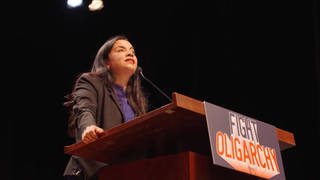
Former Colombian President Álvaro Uribe was recently sentenced to 12 years of house arrest after he was found guilty of bribing imprisoned members of paramilitary groups to coax them into retracting damaging testimony exposing Uribe’s ties to U.S.-backed, right-wing paramilitary groups. Uribe was a staunch U.S. ally who ruled Colombia from 2002 to 2010, during which time there were thousands of extrajudicial killings of civilians, who were then purposely mislabeled as rebel fighters in what became known as the “false positives” scandal. “Álvaro Uribe is a very powerful figure. He is the leading figure of the far right in Colombia and, I would say, a leading figure of the far right in the Americas,” says leftist Colombian Senator Iván Cepeda. His own father, leading leftist politician Manuel Cepeda, was assassinated in 1994 by right-wing paramilitaries working with the government.
Transcript
AMY GOODMAN: This is Democracy Now!, democracynow.org, The War and Peace Report. I’m Amy Goodman.
We turn now to Colombia, where the former President Álvaro Uribe was recently sentenced to 12 years of house arrest, after he was found guilty of witness tampering and bribery. Uribe is the first former president of Colombia to be found guilty of a crime, convicted of bribing imprisoned members of paramilitary groups to coax them into retracting damaging testimony exposing his ties to U.S.-backed, right-wing paramilitary groups.
Uribe was a staunch U.S. ally who ruled Colombia from 2002 to 2010. During Uribe’s presidency, there were thousands of extrajudicial killings of civilians, who were then purposely mislabeled as rebel fighters in what became known as the “false positives” scandal. The killings took place between 2004 to ’08 as the U.S.-backed Colombian military intensified its crackdown against FARC, the Revolutionary Armed Forces of Colombia.
To discuss all this, Democracy Now!'s Juan González and I spoke last week with the leftist Colombian Senator Iván Cepeda in Bogotá, who spearheaded efforts looking into Uribe's collaboration with paramilitaries. Senator Cepeda’s father, the leading leftist politician Manuel Cepeda, was assassinated in 1994. One note: This interview took place before Cepeda’s colleague, the Colombia Senator Miguel Uribe — no relation to the former president — died two months after he was shot at a campaign rally in the capital Bogotá. We spoke to Senator Iván Cepeda last Wednesday.
AMY GOODMAN: It’s an honor to have you with us, Iván Cepeda. If you can talk about the significance of what has happened to Uribe right now, his conviction and sentencing, and what it means for a global audience?
SEN. IVÁN CEPEDA: [translated] First of all, I’d like to thank Amy Goodman, Juan González and Democracy Now!
I would say that the significance of what happened in the Colombian judiciary on July 28th, well, that there are two main points. First, it’s the first time that a former head of state has been criminally charged, and particularly has been found guilty, has been convicted of criminal charges in Colombia. And second, Álvaro Uribe is a very powerful figure. He is the leading figure of the far right in Colombia and, I would say, a leading figure of the far right in the Americas. When he became president in 2002, he sought to impose a model that legalized the narcoparamilitary forces and that sought to leave them in positions of power.
JUAN GONZÁLEZ: Could you lay out some of the evidence that was presented against Uribe, and talk about your personal relationship to this case?
SEN. IVÁN CEPEDA: [translated] In 2011, when I went from being a member of a human rights organization to a member of the Colombian Congress — I’m still a human rights activist — two members of the paramilitaries gave statements in which they said that Uribe had founded a paramilitary group at one of his large ranches. And in the Congress, I organized a debate about this and — about this criminal act, and then Uribe became involved in a major criminal enterprise in which there were 20 false witnesses, who were either former drug traffickers or members of the paramilitaries, 20 persons who then made false statements.
JUAN GONZÁLEZ: And Uribe filed a libel suit against you in 2012. Would you talk about that and how that developed?
SEN. IVÁN CEPEDA: [translated] Yes. When Uribe tried to say that the paramilitaries’ statements were slanderous, he then said that I had tried to bribe them, in the form of money and legal assistance, to get them to make statements against Uribe and against his brother Santiago. And then, when the Supreme Court investigated the situation in 2018, they found that I did not do anything illegal. And to the contrary, they turned the situation around and began to investigate Uribe for having tried to change the statements of paramilitaries in prison. And he became the one investigated, and I became the victim.
JUAN GONZÁLEZ: Can you talk, as well, about other investigations against Uribe — for instance, the 1997 massacre of farmers by the paramilitaries when Uribe was governor of Antioquia?
SEN. IVÁN CEPEDA: [translated] Yes. Uribe has been facing many investigations. But if we talk about the 1990s, there are three main ones. This is when he was the governor of Antioquia, as you said. First was the assassination of leading human rights defender Jesús María Valle, who had been looking into many complaints of violations carried out by the government when Uribe was governor. Second, the massacres of El Aro and La Granja, which were carried out by paramilitary groups in Antioquia. And third, this other matter of the formation of a paramilitary group at his hacienda, a paramilitary group known as the Bloque Metro. Now, these three investigations are all being merged together today, and it seems that they may well receive greater impetus now that this decision has come down in my case concerning the situation of the paramilitary groups and Uribe.
AMY GOODMAN: Senator Cepeda, you are sitting in your office, and behind you is — I think it’s an iPad, that says “6.402.” Can you explain what that number is, and also tell us what happened to your father, the leading leftist politician, Manuel Cepeda?
SEN. IVÁN CEPEDA: [translated] Well, that’s the figure that’s been established by the judicial authorities in what are poorly named the “false positives.” These are young people who were taken away and murdered by members of the army. Right now that figure is 6,402, but it’s presumed that there are many more. And they were accused of being terrorists and guerrillas, but they were just young people looking for work.
Now, my father, he was assassinated more than 30 years ago. Now, in the wake of a decision by the Inter-American Court, it was determined — this is the Inter-American Court of Human Rights. It was determined that he was assassinated by members of the military who carried out the operation, working together with paramilitary forces. And the Colombian state has now expressed apologies in this matter.
AMY GOODMAN: I wanted to ask you about the U.S. role through these decades in supporting what is known as Plan Colombia, right through to now, where you have the U.S. Secretary of State Marco Rubio denouncing Uribe’s trial. Rubio said on social media, “Uribe’s only crime has been to tirelessly fight and defend his homeland. The weaponization of Colombia’s judicial branch by radical judges has now set a worrisome precedent.” It almost makes me think that they might impose more tariffs on Colombia to take him out of house arrest. But if you can comment on the U.S. role through these years, Senator Cepeda?
SEN. IVÁN CEPEDA: [translated] Regarding the years under Plan Colombia, well, it’s been clearly established that during those years Colombia saw massive human rights violations. Indeed, these were the worst figures ever for forcible displacement, disappearance, extrajudicial executions and major growth in paramilitary activity. And this is exactly during the years that this Plan Colombia aid package was being provided, which was supposedly aimed at reducing violence.
Now, as regards what the Secretary of State Marco Rubio has said about the conviction of Uribe, I would simply subscribe to the words of Representative Jim McGovern, who has said that this is a shameful statement, because it is gross meddling in Colombian sovereignty. It’s really a reckless accusation against the Colombian judiciary, in general, and against this judge, in particular, who clearly acted within the rule of law and made a decision based on judicial consideration. So, I would simply repeat what President Petro said yesterday, which is that we call for respect for our national sovereignty.
JUAN GONZÁLEZ: Senator, it’s been nearly 10 years now since the Colombian government reached peace accords with the FARC, the largest of the many guerrilla groups in Colombia over the last 60 years. What is the status of political violence in Colombia today? Are trade unions and human rights groups free to operate?
SEN. IVÁN CEPEDA: [translated] The peace process and the 2016 peace agreement with the FARC has represented a major historical step forward in Colombia. There was significant reduction of violence and, in some parts of the country, very notable improvements in the human rights situation.
Unfortunately, however, this has not represented an end to violence. There are still guerrilla groups. There are still drug-trafficking groups, as well as paramilitary networks. So, drug trafficking is still a major problem that needs to be addressed, and it needs to be addressed in a new way, in ways that — not in the way traditionally that it was addressed.
And finally, under the current Petro administration, there has been a major reduction in human rights violations by military forces. Human rights violations have reduced significantly, and in some areas and at some times, practically nonexistent.
JUAN GONZÁLEZ: I wanted to ask you, as well, about the current government’s stand on the Israeli war against the Palestinians, especially the genocide in Gaza. President Petro has been very outspoken on his positions. What kind of reaction has this resulted in for Colombia?
SEN. IVÁN CEPEDA: [translated] President Petro — and this is something we’re very proud of — has been an international leader in this respect, not only before the latest phase of the genocide began, at which — even before October 2023, President Petro had proposed an international conference to resolve the peace issue as between Israel and Palestine. And then, in the latest phase, which is to say after the action by Hamas, and particularly since the genocide by Israel against the Palestinian people, he took a very clear stand, broke relations with Israel, sought justice, has sought justice internationally, and has called for an immediate halt to the violence. Similar positions have been voiced in Latin America and internationally of support for these same stands, but the response really needs to be much clearer and much stronger, particularly from Europe, say, Canada and the United States, where it has been too weak so far.
AMY GOODMAN: Colombian leftist Senator Iván Cepeda, speaking to us from Bogotá. Former Colombian President Álvaro Uribe was recently sentenced to 12 years of house arrest, after he was found guilty of witness tampering and bribery. That does it for our show. I’m Amy Goodman. Thanks for joining us.













Media Options